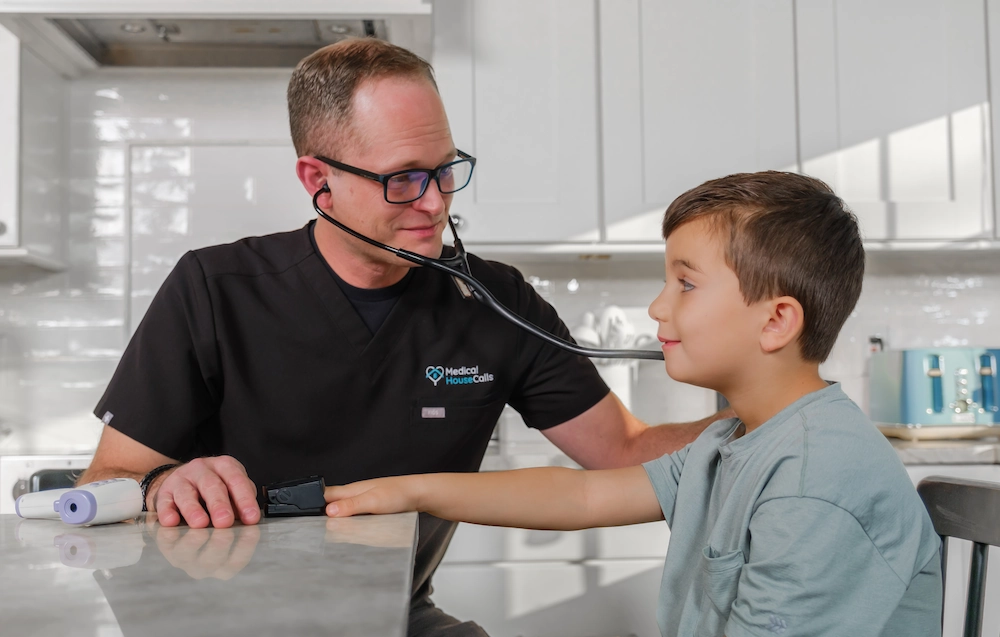Table of Contents
Bite Back: Yellow Fly Bite Relief Demystified
Yellow flies, notorious for their painful bites, can turn a peaceful outdoor excursion into a battle against relentless discomfort. These pesky bugs are prevalent in many regions, especially during warmer months.
This article will explore effective remedies for yellow fly bites and provide practical tips to keep these bothersome insects at bay. Whether planning a hike, a camping trip or enjoying your backyard, arming yourself with knowledge makes a difference in your quest for outdoor activities.

Urgent Care, Right at Home
Overview of Yellow Fly Bites
As members of the Tabanidae family, yellow flies are known for their painful and persistent assaults on humans and animals alike. Found in various regions around the world, often in warm and humid climates, these aggressive insects can ruin outdoor recreation.
Identifying Yellow Flies
Yellow flies, also known as horse or deer flies, are often mistaken for common house flies due to their similar size and coloration. However, there are distinguishing features to identify them:
- Size and Color: Yellow flies are larger than house flies, measuring about ¼ to ½ inches long. They are named for their distinctive yellowish or golden coloration, which can vary depending on the species.
- Eyes: Unlike house flies, yellow flies have large, prominent compound eyes that may appear metallic or iridescent in certain lighting conditions.
- Wings: Yellow flies have transparent wings with distinct venation, which may be visible upon close inspection.
- Behavior: These flies are aggressive biters, often targeting exposed skin areas. They are active during daylight hours.
- Habitat: Yellow flies are found near rivers, lakes, and marshes, where they breed and lay their eggs in moist soil or vegetation.
Immediate First Aid Steps for Yellow Fly Bites
Step #1: Wash the Affected Area
After being bitten, clean the affected area with soap and water. This removes dirt, bacteria, or venom that the insect’s bite may have introduced. Wash the area using mild soap and lukewarm water, then pat it dry with a clean towel.
Step #2: Apply Cold Compress
To alleviate pain, swelling, and itching associated with yellow fly bites, apply a cold compress to the affected area. Use a clean cloth soaked in cold water or a cold pack wrapped in a towel. Apply the compress for 10 to 15 minutes, repeating as needed.
Step #3: Use Anti-Itch Cream or Calamine Lotion
To reduce itching and irritation, apply an over-the-counter anti-itch cream or calamine lotion to the affected area. These products can soothe the skin and alleviate discomfort. Follow the instructions on the product label for proper application and dosage.
Step #4: Take Oral Antihistamines
If itching and swelling persist, consider taking diphenhydramine (Benadryl), loratadine (Claritin), or cetirizine (Zyrtec). These medications can relieve allergic reactions and reduce itching associated with insect bites. Follow the recommended dosage instructions and consult a healthcare professional if you have concerns or underlying health conditions.
Step #5: Monitor for Signs of Infection
After administering first aid, check the affected area for increased redness, swelling, warmth, or pus. If you notice these symptoms or the bite does not improve within a few days, seek medical attention. Infections from insect bites can sometimes require antibiotic treatment.
How to Reduce Swelling and Itching
Utilizing topical treatments, over-the-counter remedies, and home therapies can reduce discomfort and promote faster healing.
Topical Treatments for Yellow Fly Bites
- Hydrocortisone Cream: Over-the-counter hydrocortisone cream can reduce inflammation, swelling, and itching. Apply a thin layer of cream to the affected area as directed on the product label.
- Calamine Lotion: Calamine lotion contains ingredients such as zinc oxide and ferric oxide, which have soothing properties and can alleviate itching and irritation. Apply a small amount of calamine lotion to the bite site and allow it to dry.
- Aloe Vera Gel: Aloe vera gel is known for its cooling and anti-inflammatory properties, making it an effective remedy for relieving itching and swelling. Apply pure aloe vera gel to the affected area and massage until absorbed.
Over-the-Counter Remedies for Yellow Fly Bites
- Antihistamine Creams: Topical remedies, such as diphenhydramine cream (Benadryl) or hydrocortisone cream, can reduce itching and inflammation. Follow the instructions on the product label for proper application.
- Antihistamine Pills: Oral antihistamine medications, such as diphenhydramine (Benadryl), loratadine (Claritin), or cetirizine (Zyrtec), can provide relief from itching and allergic reactions. Take the medication as directed or consult a healthcare professional for the appropriate dosage.
Home Therapies for Relief of Yellow Fly Bites
- Ice Packs: Applying a cold compress or ice pack to the affected area can reduce swelling and numb the discomfort. Wrap the ice pack in a thin cloth and apply it to the bite site for 10 to 15 minutes.
- Baking Soda Paste: Mix baking soda with water to create a thick paste, then apply it to the bite site and allow it to dry. Baking soda has alkaline properties that neutralize the acidic compounds in insect venom, providing relief from itching and inflammation.
- Oatmeal Bath: A bath with colloidal oatmeal or oatmeal bath products can soothe itching and irritation. Soak for 15 to 20 minutes to release the calming effects of oatmeal on the skin.

Prevention Strategies Against Yellow Fly Bites
1. Wear Protective Clothing:
To minimize skin exposure, wear long-sleeved shirts, long pants, socks, and closed-toe shoes. Opt for light-colored clothing, as yellow flies are attracted to dark colors.
2. Use Insect Repellent:
Apply insect repellent containing DEET (N, N-diethyl-meta-toluamide) or picaridin to exposed skin. Follow the instructions on the product label for proper application and reapplication intervals.
3. Avoid Peak Activity Times:
Yellow flies are most active in the early morning and late afternoon. If possible, plan outdoor activities in midday or early evening.
4. Stay Away from Breeding Areas:
Yellow flies breed near bodies of water. To minimize the risk of encountering yellow flies, avoid spending time near these habitats, especially during peak breeding seasons.
5. Install Screens and Netting:
When outdoors, particularly at picnics, camping trips, or barbecues, use screens, netting, or mosquito nets.
6. Keep Surroundings Clean:
Yellow flies are attracted to decaying organic matter, such as rotting fruits, vegetables, and animal waste. Keep outdoor areas clean and free of debris to reduce the presence of attractants that may draw yellow flies to your vicinity.
7. Use Fans or Repellent Devices:
Employing fans or portable repellent devices can create airflow and disrupt the flight patterns of yellow flies, making it more difficult for them to land and bite.
8. Check Weather Conditions:
Yellow flies are more active on warm, humid days with minimal wind. Check the forecast and consider rescheduling activities if conditions are favorable for yellow fly activity.
When to Seek Medical Attention
If you experience difficulty breathing, swelling of the face or throat, dizziness, or rapid heartbeat, seek emergency medical assistance. Moreover, if the bite site becomes red, swollen, warm to the touch, or oozes pus, it may indicate an infection. Individuals with compromised immune systems, pre-existing medical conditions, or concerns about a potential allergic reaction should consult a healthcare professional for guidance and appropriate management.
Schedule an Appointment with Medical House Calls
Preventing and managing yellow fly bites involves a combination of proactive measures and first aid. By wearing protective clothing, using insect repellent, and avoiding peak activity times and breeding areas, you can minimize encountering these pesky insects. In the event of a bite, wash the affected area, apply cold compresses, and take over-the-counter remedies to alleviate swelling and itching.
However, if you have allergic reactions or signs of infection, consider the convenience of Medical House Calls. With same-day and next-day appointments, their team provides personalized care to address your concerns.

Concierge Primary Care At Your Doorstep
Experience primary care without leaving your home. Join our waitlist today and enjoy healthcare tailored to your needs–comfortably and conveniently.


















